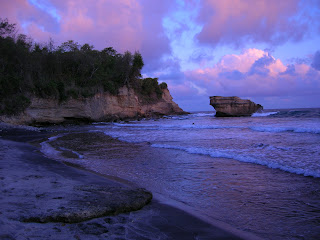Our residency program has been sending senior residents down to St. Lucia for several years now. We volunteer in an Emergency Department at a small hospital there and in exchange, they provide us with food and housing. It's a different experience than back home. Resources are limited, and patients must pay for service and medicines up front. Patients pay a fee before they are even seen in the Emergency Department, and then they get billed for any medications dispensed, or supplies used, like gauze and suturing materials. If x-rays are ordered, they have to pay for them before they will be taken and blood tests are paid for before they are drawn.
This was our drug supply cabinet. It was organized by shelf. The third shelf was mostly empty, and was our only cache of antibiotics to work with.
 Unfortunately, most of our antibiotic supply was this:
Unfortunately, most of our antibiotic supply was this:
 If you look closely, you'll notice that it's expired.
If you look closely, you'll notice that it's expired.
The Emergency Department itself was fairly small, and is one of the only air-conditioned areas in the hospital. There were four curtained off rooms. The big pink chair is the asthma chair, and standing next to it is a large oxygen tank.

The system seems to work well. Most of the patients are in and out fairly quickly. I put on splints, reduced a dislocated shoulder, and did a fair amount of suturing. What we could fix, we fixed, and unfortunately the mortality rate seems to be fairly high. The hospital has a fair amount of specialists- (pediatrics, obstetrics, orthopedics, general surgery) but there's not a whole lot that they can do for things like strokes or heart attacks. I saw one child with chicken pox-- which I haven't actually seen at all during my residency because of the vaccine. Another of my patients had lost a leg due to leprosy.
----------
There is only one certified paramedic on the island, and unfortunately he was not on any of the ambulances that brought me patients. The ambulances seem to function more like the old hearse system. They are minivans with equipment inside, but for some reason, other than arriving with oxygen, nothing seems to get done for the patients. IVs are not started, medicines are not administered, and sometimes you may not even get a set of vital signs.
My patient with the dislocated shoulder was transfered from a clinic and had gotten nothing for pain. He apparently bit his first ambulance attendant, so they dropped him back off at the clinic and took their attendant to a different hospital for a tetanus injection before returning back to pick him up and bring him in.
Two of my patients were brought in pulseless and apneic (not breathing) and neither one of them had CPR being performed as they arrived. When I asked one of the ambulance dudes why they weren't doing anything, he said that the patient had already had a minute of CPR by a bystander when they arrived, and it didn't help, so he didn't think the patient needed CPR or ventilation apparently! So our codes were pretty futile, but we attempted anyway. There was only one ventilator in the hospital, and it was occupied by some guy with a head injury, so intubation would have meant riding in the ambulance with the patient to a hospital over an hour away and bagging the whole time.
----------
During our two weeks, the Carifta Games were going on. The Carifta Games are kind of like a Caribbean Olympics for athletes ages 14-20. Several of the athletes eventually go on to compete in the Olympics. The group of residents prior to ours had helped develop a mass-casualty plan for the event with the hospital, and we were there to staff the medical stations. The actual spectator turnout seemed to be a lot less than what was originally anticipated, and the weather was mild. Something like 200 patients were seen over 3 days, but most of it was minor cuts, twisted ankles, nausea, or "Can you just check my blood pressure?" type complaints. I spent most of my day there watching the races and long jump competition.
These stands were in the sun, so they were largely empty. The one behind me probably held a couple thousand people.
 If I remember the uniforms right, these two young ladies were from Barbados.
If I remember the uniforms right, these two young ladies were from Barbados. 
The Jamaican athletes were clobbering all of the other teams, just like in Beijing.

Our favorite thing to do after work in the evening (unfortunately it was dark by 6:30!) was to sit around drinking and playing cards. The hospital sold cases of Piton (local beer) at a discount. If I worked the evening shift, the day was spent hopping on buses and getting myself down to the nearest beach, where the wind was apparently perfect for kite surfing and windsurfing. It was also a great spot to pull up a towel in the shade and relax before work.



My favorite reading spot:

 Of course it wasn't all work while we were in St. Lucia. Our group managed to stay at a resort for 2 nights/3 days to relax.
Of course it wasn't all work while we were in St. Lucia. Our group managed to stay at a resort for 2 nights/3 days to relax.







 View of Gros Piton from the bottom:
View of Gros Piton from the bottom:



 Unfortunately, most of our antibiotic supply was this:
Unfortunately, most of our antibiotic supply was this: If you look closely, you'll notice that it's expired.
If you look closely, you'll notice that it's expired.
 If I remember the uniforms right, these two young ladies were from Barbados.
If I remember the uniforms right, these two young ladies were from Barbados.









